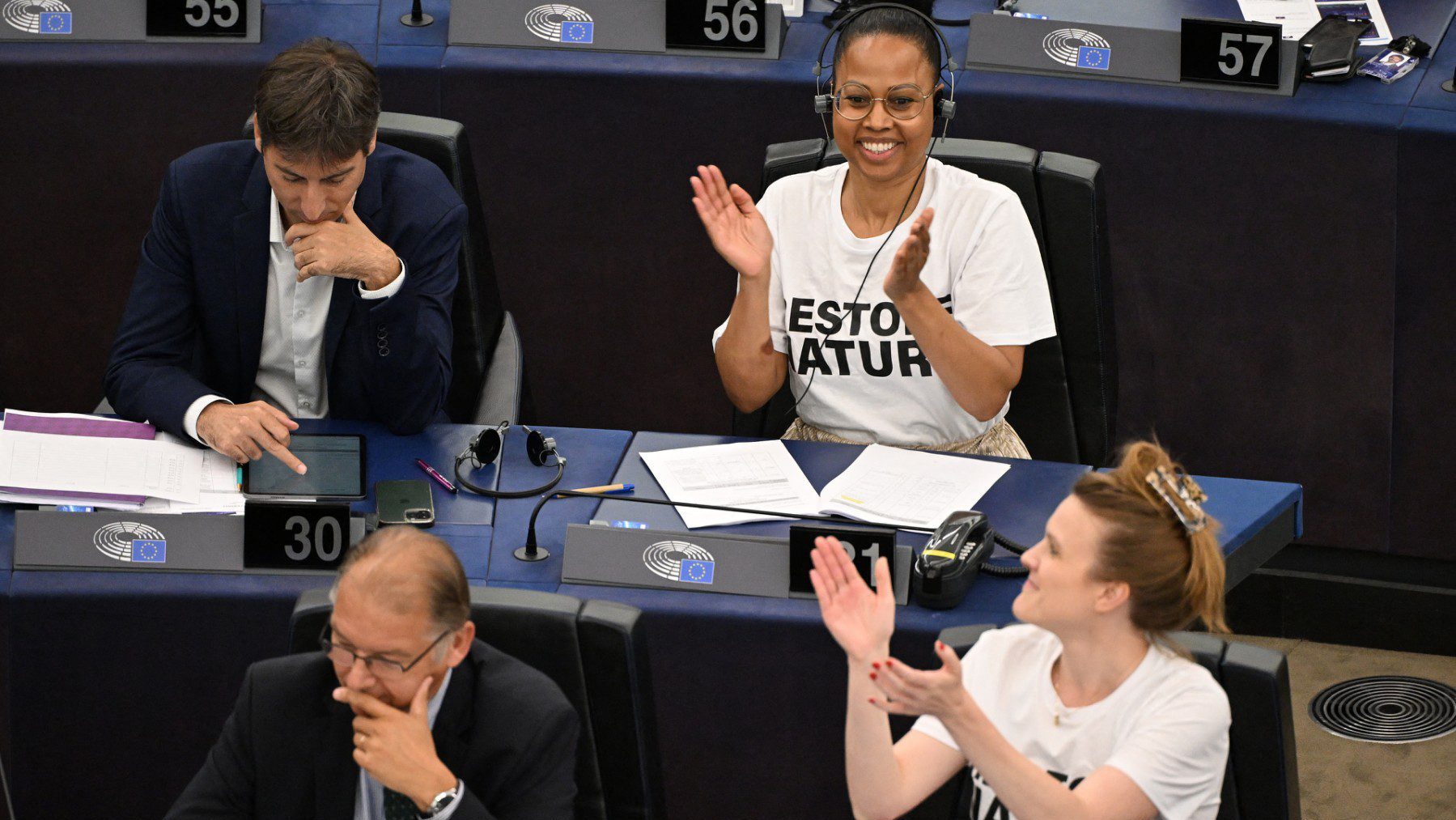
Members of the European Parliament wearing tee-shirts reading “Restore Nature” react as they take part in a voting session on EU nature restoration law during a plenary session at the European Parliament in Strasbourg, eastern France, on July 12, 2023.
Photo: FREDERICK FLORIN / AFP
EU member states will likely be forced to designate at least 20% of their land area as unfarmable over the coming decade, after MEPs gave their backing to the Nature Restoration Law (NRL) at a plenary session in Strasbourg on Tuesday. This passed despite hopes that a populist alliance with the centrist European People’s Party (EPP) could scupper the Bill at its last legislative hurdle.
The NRL, which was first proposed by the European Commission in 2022, imposes strict regulations on land, river, and sea use, ostensibly to prevent further environmental degradation.
Regarded as the last major piece of EU green legislation before June’s European elections, the NRL had previously prompted disunity within the EPP group. Against a backdrop of Europe-wide protests from farmers, agricultural groups fear that Brussels was recklessly endangering their livelihood as well as jeopardising the food supply during a period of price inflation.
Regardless, the NRL easily passed a session of the European Parliament with 329 votes in favour, 275 against and 24 abstentions. It now requires final approval from member states at the European Council before becoming law.
Despite rumours in EU circles that the EPP and even some MEPs from the liberal Renew group could listen to farmers’ concerns and vote against the NRL, the bill cleared the Parliament with the support of green, Left and centrist MEPs as well as some votes from the centre-right.
At a time when the EPP and its Christian Democratic affiliate parties would gladly tone down the green rhetoric ahead of the upcoming elections, EPP chiefs had previously given orders to vote against the NRL. One Romanian MEP, Siegfried Mureșan, warned against “more forms of bureaucracy and reporting obligations for farmers.”
A combination of abstentions and 25 EPP MEPs voting in favour of the NRL—despite the demands of party chief Manfred Weber—meant that the last-minute attempt to thwart the bill was in vain. The EPP’s five-person Irish delegation indicated their intention to rebel against the party line earlier in the day and vote for the NRL.
In a statement to The European Conservative, Irish MEP Seán Kelly said that previous reservations over food security had been met and he denied it represented a type of EU or statist “land grab.”
This sentiment was countered by farming representative Francie Gorman who warned following the vote that “uncertainty on the potential impact on farmland and production” would hamper the rollout of the NRL across Europe.
Similarly, the conservative ECR parliamentary group issued a statement prior to the vote warning about Brussels’ continued “top-down approach” when it came to the environment, adding it was “unwise to rush through this legislation hastily just before the end of the term.”
French nationalist MEP Aurélia Beigneux was also adamant in her opposition to the NRL, warning that national competencies were being stripped away from member states as part of an ideological mission to incapacitate EU agriculture.
“If we are in favour of preserving nature, we oppose all standards which interfere in our national policies and which penalise even more so our agriculture and our economy vis-à-vis other powers” Beigneux said, adding that MEPs had rejected an earlier draft of the NRL last year at committee stage.
On Monday morning, protesting farmers took to the streets of Brussels to make their voices heard on the effect EU green policies were having on their industry.
Separate from the NRL, on Tuesday afternoon MEPs also gave their approval to impose new financial penalties on corporations found violating environmental laws. Today’s votes are seen by many as the last gasp of the EU’s post-2019 green agenda ahead of an expected surge for the Right in June’s European elections.
